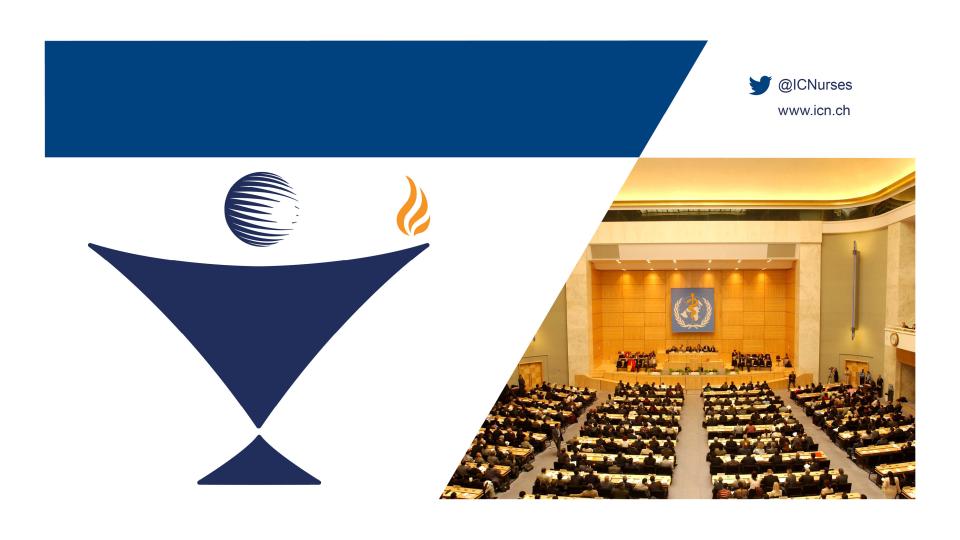International Council of Nurses raised voice of nursing at 144th WHO Executive Board meeting

Geneva, Switzerland; 6 February 2019 – The International Council of Nurses (ICN) represented the voice of nursing at the 144th session of the World Health Organization Executive Board (WHO EB) meeting held in Geneva last week. ICN presented four interventions: drawing attention to the role of nursing in achieving the right to the highest attainable standard of health through Universal Health Coverage; emphasising that nurses must be involved in developing national action plans to prevent, detect and respond to substandard and falsified products; underscoring that nurses are intrinsically linked to the ability of countries to address health priorities and achieve the SDGs; and outlining that patient safety is of utmost importance to the over 20 million nurses worldwide who have an ethical duty to do no harm and promote the health and wellbeing of individuals, families and communities.
Howard Catton, Director, Nursing, Policy and Programmes, who delivered many of ICN’s interventions last week, said, “Nurses are central to achieving and addressing global health policies, providing access to healthcare and primary healthcare. We need to lobby the WHO and governments to invest in nursing and support the development of nurse leaders. ICN plays a key role in ensuring that the voice of nursing is heard at WHO. Across our interventions, we stressed nurses’ relationship to safety, quality and access to healthcare for people.”
In its intervention given under agenda 5.5 “Primary Health Care towards Universal Health Care”, ICN outlined that nurses are the principal group of healthcare workers providing primary healthcare (PHC) across different setting; and that the nursing workforce is equipped to ensure successful implementation of PHC approaches. ICN noted that the WHO’s draft Declaration on PHC lacks the word “people-centred” and that this should be amended in line with the integrated people-centred health services (IPCHS) 2016 resolution and to bring equity and quality together at the frontline.
Under agenda 6.2, “Member State mechanism on substandard and falsified products”, ICN outlined that nurses prescribe, administer and monitor patient treatment and are therefore well-positioned to detect SF medical products. As such, nurses must be involved in developing national action plans to prevent, detect and respond to SF medical products and are essential in implementing the related policies.
Under agenda 6.3 “Global strategy on human resources for health: workforce 2030”, ICN expressed its thanks to WHO for the report that highlights the centrality of the health workforce to delivering WHO’s “triple billion” goals. ICN underlined that nurses, who make up approximately half of the health workforce, are intrinsically linked to the ability of countries to address health priorities and achieve the SDGs. ICN is collaborating with WHO to develop the first-ever State of the World’s Nursing Report what will provide a global picture of the nursing workforce and inform national policy on strengthening nursing in order to make meaningful progress toward UHC and SDGs. ICN urged Ministries of Health to proactively support the development of the report and nursing leaders to be actively engaged.
Following this intervention, Dr Tedros Adhanom Ghebreyesus, Director-General of WHO, announced the Executive Board’s support of ICN/Nursing Now proposal to designate 2020 as the Year of the Nurse and Midwife. The WHO EB also recommended to create an annual Patient Safety Day. Both proposals are very significant to nursing and will go to the World Health Assembly in May for consideration.
Under agenda 6.6 “Global action on patient safety”, ICN emphasised that patient safety is of utmost importance to the over 20 million nurses worldwide who have an ethical duty to do no harm and promote health and wellbeing of individuals, families and communities. As frontline healthcare professionals, nurses are educated to prevent patient safety incidents such as medication errors, care and treatment errors, trips and falls, and healthcare-associated infections. Critical to preventing these incidents is safe nurse staffing. Safe, effective and needs-based nurse staffing levels ensure that there is an appropriate number of nurses with a suitable mix of education, skills and experience available at all times. ICN urged governments to invest in safe staffing as it has proven to be cost-effective and lead to positive patient outcomes.
The text of the ICN interventions at the 144th session of the WHO EB meeting can be accessed here.
The WHO EB meets at least twice a year; the main meeting is normally in January, with a second shorter meeting in May, immediately after the World Health Assembly (WHA). The Executive Board agree on the agenda and the resolutions to be considered by the WHA in May. The Executive Board is composed of 34 individuals technically qualified in the field of health, each one designated by a Member State who are elected for three-year terms.
ICN has been in official relations with the WHO since 1948, working collaboratively on many projects of mutual interest over the years and, as such, actively participates in the WHO EB meetings and makes interventions on issues related to nursing. As usual, ICN will be taking a delegation of nurses to WHA in May to ensure the involvement of nursing in all policies in which the role of nursing must be strengthened and supported.
The main documents on the agenda for the 144th session of the WHO EB meeting can be found here.
Note for Editors
The International Council of Nurses (ICN) is a federation of more than 130 national nurses’ associations representing the millions of nurses worldwide. Operated by nurses and leading nursing internationally, ICN works to ensure quality care for all and sound health policies globally.
For further information please contact
Gyorgy Madarasz, Press Officer, International Council of Nurses, Tel: +41 22 908 01 16
ICN/PR2019#05